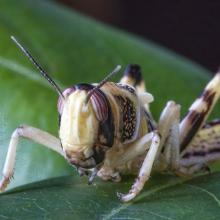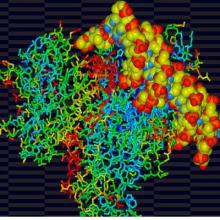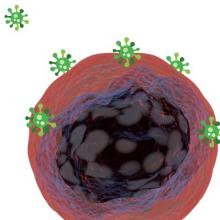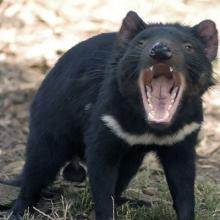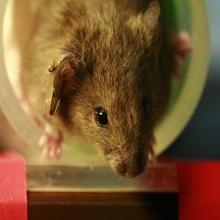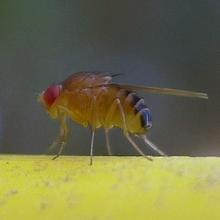Newsroom
Florida–California CaRE² Health Center flyer promoting the CaRE² Contact Registry. The flyer highlights free, voluntary participation, includes a QR code, and features programs such as the Community Scientist Research Ambassadors Program, Postbac Training, We CaRE² Podcast, and CaRE² Newsletter.… more
What if cancer treatment could tap into a natural safety system already built into our cells? Researchers are studying a protein called TRAIL (Tumor Necrosis Factor-Related Apoptosis-Inducing Ligand) as a possible future therapy. TRAIL works by triggering apoptosis; the body s built-in process that… more
What if improving cancer survival didn't require a new drug; just a different appointment time? A recent clinical trial suggests that the clock may play a powerful role in how well cancer treatment works. Researchers found that patients with advanced non-cell lung cancer who received… more
What if fighting cancer could be as simple as turning on a light switch?Recent advances in nanotechnology led to a discovery of a new approach that uses LED light and nanoparticles to attack cancer cells while leaving healthy cells untouched. In laboratory studies, this light-activated… more
Consuming aspartame, an artificial sweetener found in diet sodas and other food products, may be linked to an increased risk of cancer. The decision by the World Health Organization to list aspartame as a carcinogen has faced criticism from other researchers and from the US FDA. Research used to… more
Air pollution causes many cases of lung cancer every year. But how?
It is well known that smoking tobacco causes cancer by changing (mutating) DNA. The damaged DNA make defective products and that leads to cancer. Not smoking is a simple way to prevent those cancers. But we can't control the air… more
Currently, there are only a few ways to detect cancer and they can be invasive and often unpleasant. What if it was possible to detect cancer with contact lenses?
Researchers at the Terasaki Institute are working to develop a contact lens that can detect cancer by identifying cancer cell products… more
Replimune®, otherwise known as RP2, is a cancer therapy designed to target many types of cancers, including skin, oesophageal, head, neck, and uveal melanoma (a rare type of eye cancer). Current treatments for these cancers include surgery, chemotherapy, radiation therapy, targeted therapy,… more
Due to their voracious appetite for food crops, locusts are not usually thought of as helpful,
That could change. Work done at Michigan State University has shown that locusts are able to tell the difference between normal and cancer cells. Not only that, but they can tell the difference between… more
The P53 protein is known to prevent cancer. It is one of the best known and frequently studied cancer genes. So it may come as a surprise that when the P53 gene is too active, it can cause cancer.
In mice, activating P53 for a long time led to inflammation and conditions that favor the development… more
Does it matter to cancer whether it's day or night? The answer seems to be 'yes'.
Scientists have known that the cells in plants and animals go through periods of high and low activity. These patterns are called circadian rhythms. The impact of circadian rhythms on the spread of cancer was… more
A small cancer clinical trial gave historical results. Every patient in the trial had a complete remission of their rectal cancer. The 12 patients received a treatment, dostarlimab, every three weeks for six months. The treatment is designed to activate the patient's own immune system to… more
Viruses are generally thought of as disease-causing villians. This is particularly true because of the COVID pandemic - caused by a virus.
For some cancer patients, that view is hopefully going to change. Using viruses to kill cancer is an old idea, but a new clinical trial will test a modern… more
Skin cancer is the most common form of cancer, with millions of cases per year in the U.S. alone. About one in five people in the U.S. will get skin cancer during their lifetime. These cancers are often diagnosed by removal of small amounts of skin from suspected cancers (biopsies). MOST biopsies… more
Nine in ten cancer deaths are linked to the spread (metastasis) of cancer from its original location to other parts of the body. HOW and WHY cancer cells move is a huge question. Some recent advances are shedding light on this mysterious, but deadly process.
When treated with drugs or other… more
Tasmanian devils are known as ferocious predators. Maybe too ferocious! Devils are threatened with extinction by a very unusual cancer, devil facial tumor disease (DFTD). Unlike almost all other cancers, DFTD spreads from animal to animal - it is transmitted when they fight and bite each… more
Researchers have joined an immune-boosting agent (CpG) and a tumor-targeting chemical (PIP) together to create a novel drug (PIP-CpG) to fight cancer. When injected directly into tumors or into animals with cancer, the PIP part of the chemical causes it to target cancer cells and the CpG part… more
Natural killer (NK) cells are an amazing part of the human immune system and have the potential to kill breast tumor cells. However, NK cells need a trigger for them to do so. Dr. Wei and his team from Clemson University came up with the idea of using a bifunctional protein to bridge the NK cells… more
Why does cancer kill? That is a surprisingly hard question to answer. When cancer spreads (metastasizes), the affected organs may not work as well, but that does not provide the whole answer. Work with tiny fruit flies may be helping to provide some answers to this question and also providing ways… more
Can cancer cells, or any cells, taste things? Not the way we do, but cells have proteins on their surface that act like antennas. These proteins (called receptors) receive signals from outside the cell and can cause the cells to change what it's doing.
New research results provide some interesting… more









